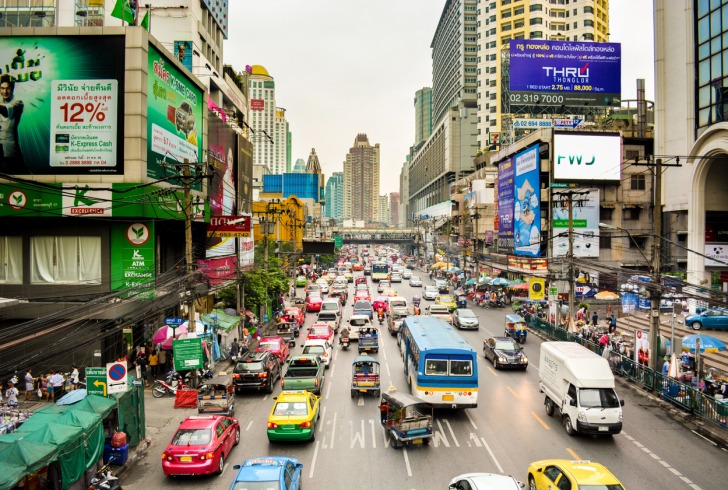In recent years, Thailand has become a beacon for adventurous souls seeking to teach English abroad.
The Land of Smiles not only captivates with its rich cultural tapestry and breathtaking landscapes but also beckons educators with promising professional opportunities.
However, beneath the allure of this vibrant Southeast Asian destination lies a crucial consideration for any visitor: safety.
From bustling urban centers to serene rural locales, the safety dynamics can vary, and it is best to inform yourself beforehand.
Contents
General Safety in Thailand
While Thailand generally maintains a reputation for being safe, it is always important to have a nuanced understanding of Thai society and culture.
Crime rates in Thailand, when viewed holistically, can seem relatively low, but English teachers may encounter specific challenges.
Common types of crimes affecting newcomers to Thailand include petty theft, scams, and occasional instances of assault.
The country is considered generally safe for women, although it is always a good idea to follow basic rules of precaution as you would back home.
While urban areas like Bangkok may face a higher incidence of petty crime, rural areas are not immune.
The distinction between urban and rural safety is nuanced; urban centers may witness a higher volume of opportunistic crimes, whereas rural areas might present unique challenges related to isolation and limited access to emergency services.
Culture Considerations
Navigating cultural considerations is imperative for the safety and well-being of those wishing to teach English in Thailand.
A cornerstone of fostering a secure environment is the utmost respect for Thai customs and traditions.
Engaging in cultural sensitivity training and gaining insights into local norms can significantly contribute to a positive experience.
Demonstrating respect for Thai cultural nuances, greetings, and social etiquette not only enhances personal safety but also fosters a sense of acceptance and integration.
Avoiding culturally sensitive issues, such as religious and political matters, is advised to maintain harmonious relationships within the community.
Thailand is generally tolerant, but public displays of affection and discussions about sexuality can be considered inappropriate, particularly in more conservative areas including the more rural parts of the Northern and Northeastern regions.
Embracing while being mindful of the local context is instrumental in cultivating positive connections with colleagues, students, and the broader community, ultimately contributing to a more secure and rewarding experience for English teachers in the rich cultural tapestry of Thailand.

Road Safety
Road safety is a significant consideration in Thailand, given the country’s vibrant but sometimes chaotic traffic environment.
Thai roads can be bustling with diverse modes of transportation, including motorbikes, tuk-tuks, and a variety of vehicles.
Newcomers and visitors to Thailand are encouraged to exercise heightened caution as pedestrians, and when using public transportation, to buckle up and adhere to safety regulations.
Additionally, driving practices may differ from those in other countries, so foreign drivers must familiarize themselves with local traffic rules.
Using marked pedestrian crossings, avoiding jaywalking, and wearing helmets while riding motorcycles are essential practices to enhance road safety and contribute to a secure experience while navigating Thailand’s dynamic streets.
Employment Conditions
The reputation of schools plays a crucial role in determining the overall safety of teachers.
One key factor is evaluating the reputation of the schools themselves, which involves researching online reviews, testimonials from current or former teachers, and insights from educational forums.
A school’s reputation often reflects its commitment to creating a positive and supportive work environment.
Considerations should include the institution’s adherence to employment laws, commitment to professional development, and the overall satisfaction of its teaching staff.
Equally important are the support systems in place for foreign teachers, encompassing orientation programs, mentorship initiatives, and readily available assistance for administrative or cultural challenges.
A school with robust support mechanisms not only ensures a smoother transition for foreign educators but also contributes significantly to their overall well-being and job satisfaction.
Understanding and respecting cultural dynamics in the classroom and school community is pivotal for fostering a secure and harmonious teaching environment.
By considering both working conditions within schools and the interpersonal aspects of teaching, English educators can contribute to a safer and more fulfilling professional journey in Thailand.

Health and Healthcare
Thailand boasts a well-developed healthcare infrastructure that is generally accessible and of good quality, contributing to a positive environment for expats.
Medical facilities in urban centers and popular expatriate locations are abundant, offering a range of services from routine check-ups to specialized treatments.
The quality of healthcare services in Thailand is often comparable to international standards, with many hospitals equipped with modern technology and staffed by English-speaking medical professionals.
While healthcare is generally accessible, English teachers living and working in Thailand should carefully consider obtaining health insurance to ensure comprehensive coverage.
Health insurance in Thailand not only provides financial protection against unexpected medical expenses but also ensures access to a network of reputable hospitals and clinics.
The consideration of health and healthcare is integral to the overall safety of anybody, as it establishes a safety net for unforeseen medical emergencies and contributes to their well-being and peace of mind during their stay in Thailand.
Personal Safety Tips
In daily life, practicing vigilance in transportation, particularly in crowded areas or late hours, can mitigate the risk of petty theft.
Employing basic personal security measures, such as keeping belongings secure and avoiding isolated areas, contributes significantly to overall safety.
Familiarity with emergency procedures is always handy, including having readily available contact information for local authorities and knowing the location of the nearest embassy or consulate.
Being aware of the local emergency phone number and understanding the procedures for seeking assistance in case of unforeseen events is paramount.
A modern-day tip is to join online groups or communities of expats that can provide a valuable support system, offering insights into local safety practices, sharing experiences, and providing assistance in navigating challenges.
These online networks not only enhance the sense of community but also serve as a valuable resource for practical advice, contributing to a safer and more connected experience for English teachers in Thailand.











